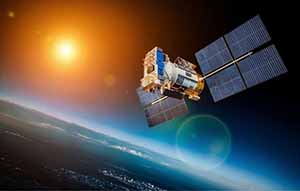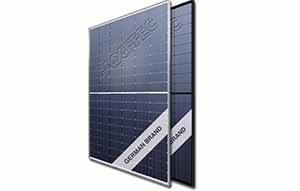Electronics Era: Explain Axitec Energy as a company in brief its journey, vision, and achievements.
Tonmy Duari: Starting with a single sales employee in 2017, now Axitec in India is selling 150 MWp and above each year and now putting up its own production lines totaling 600 Mwp in India. Axitec is an outlier in terms a European Solar company succeeding in a very price competitive Indian market.
Axitec entered the Indian market very late as compared to a lot of other big solar module manufacturers, the primary reason was that we were very apprehensive if we would be able to have sustainable business model in a the Indian market where the primary criteria for buying solar products is the price, and in such cases generally quality takes a backseat, But Axitec being a solar module brand from Germany our primary focus and our pride is the quality of our products, hence we were very apprehensive if we would be able to survive in the Indian solar market. But when we started our operations in India, we realised that there is indeed that select segment of customers here in India who understand the value of a quality products especially where the life span of the product is as long as 25 years.
The idea was to shift customers in India from the cheap lower quality Asian imports to high quality solar PV modules with warranties backed by a company which has been in the solar business for more than 2 decades, and once we did that, there has been no looking back.
Electronics Era: According to you what Energy Transformation role does Solar Power play in Developing Countries?
Tonmy Duari: You have to realise it’s not just developing countries but the entire world is affected in terms of climate change because of carbon emissions so first I will answer your question in terms of the entire world scenario right now it is absolutely imperative that we switch from fossil fuels to to renewable energy sources and I think of the renewable energy mix in the near future I think solar has is going to be the dominant technology that is going to be used having said that when you particularly look at developing economies these developing economies have have a rapid growth rates and to satisfy the power needs of such developing economies solar has become a very handy source of energy where you can have decentralised solar power plants catering to even the most remote of locations not just for you know human needs but also industrial development needs furthermore solar power plants once they are set up they need very minimal expert intervention in terms of the smooth functioning of a solar power plant and these plants are set up for 25 years so they become very reliable sources of energy hey without involving a lot of technical manpower hence their best suited for growing and developing countries.
Electronics Era: Solar Panels are the heart of every Space mission for power sources. How solar panels are revolutionizing space exploration?

Tonmy Duari: Space is a different ballgame altogether so you have to understand the commercial solar plants and solar module or a solar generating system that goes up in space there have very different functions, while yes of course the primary function is power generation but in in the sense that a solar plant which has been put up in on earth its primary motive is to you know generate electricity for people and provided for homes for businesses at the same time bringing down the carbon footprint also very importantly it’s generating money or economic benefits for the user or the buyer however in case of solar module in space the primary motive is to get the maximum power out of the sun’s solar radiation so that you are able to power up the critical equipment in space, the sun is your only refilling stationed space South it’s very very important that you use the that you extract the maximum power out of the solar radiation and for that to happen you efficiencies of these solar modules that you are going to use in space are the primary deciding factor in terms of the technology that you need to use however here on earth we have to have a balance in terms of caustic economics the materials that he use are the commercially available are they viable when you put them up and also when you recycle them how efficiently you are able to recycle them so for us in acetic we are focusing on things here on earth while of course you know whatever is used on space is you know we have seen in the past that whatever it is used in space has eventually come down to you know things being used on earth here on earth we would wait and see what kind of technologies which is being used in space futuristic technologies which are being used in space and eventually can be used here on you know here to power our earth we’re on the lookout for that but for now space is a different ball game as I said earlier and that is something that we currently not focusing on.
Electronics Era: Kindly explore Axitec Energy’s ongoing/ new projects and plans.

Tonmy Duari: This is a interesting question interesting point of time so to answer that Axitec is selling its solar products in 93 countries with 7 subsidiaries across the world we have manufacturing locations in China Vietnam Turkey and of course the EU, However now we are coming up with our own production facility in India.
Everyone knows India has very aggressive solar and renewable energy targets and we are going about it in in a way where manufacturing is included as a part of the eventual goal and there is strong focus and encouragement by the Government of India towards this So what we have decided is that we are setting up manufacturing in in India. And by Q1, 2024 we are we should have a operational capacity of 600 megawatts of solar module manufacturing and this would be of course with the latest technology we are not looking we kind of trying to leapfrog here instead off manufacturing the usual commercially available monopolistic modules we are leapfrogging to start production of N type topcon modules, which will cater to the next generation of solar power systems furthermore we are looking to have the Indian production facility hey where we are manufacturing really high quality solar modules and potentially selling to the rest of the world as well.
Electronics Era: As recently the G20 had pledged to promote solar power and renewable energy. As a leading solar module manufacturer, what revolutionary steps is Axitec going to take towards this direction?
Tonmy Duari: In terms of the targets for the g 20 nations I think what Axitec brings on to the table and in terms of accelerating growth of solar in the renewable energy mix for the g 20 nations and of course the rest of the world is that we bring a certain level of technical expertise and quality benchmarks which the current industry is struggling with . this is especially significant when a solar power plant is designed for a lifetime of 25 years this technical expertise as well as the focus of quality is extremely important and this is exactly what Axitec focuses on.
Electronics Era: According to you what is the Impact of G20 Energy Transition Strategies on Solar Markets?
Tonmy Duari: So when you look at g 20 as a group of nations India included is set out very aggressive target in terms of in terms of you know adoption adoption of renewable energy and phasing out of conventional carbon spewing energy sources however you have to understand each of these countries has its own set of you know complexities that needs to be addressed so yes there is a common target and this is I think primarily driven by the fact that you know now even the most hardcore climate change deniers they are scared and climate change is happening its not even no longer in at a doorstep its its its already there and its happening and its careers and if we do not take any actions right now I do not have a very pretty picture for us in the future anyways the point is that that each of the participating countries and their own individual targets has to be addressed and you know separately you just cannot have a common strategy for each of these nations for example here in India we have a different set of climates and different set of you know land utilization rules whereas if you go to European country it would be something that is totally different hence I personally think that while there is a common goal but you must look at each governments individual initiative to incorporate I mean how they are incorporating renewable energy and particularly solar in their you know mix of India energy mix and then go about putting your efforts in in that direction however with exotic as mentioned before our focus is quality we are not looking to you know produce mass volumes of of solar energy product rather we are looking to set benchmarks in quality of which people said benchmarks in quality which should set a minimum standard for the market.
Electronics Era: How do you see the Global Collaboration in Solar Technology Development at G20?
Tonmy Duari: I think this global collaboration is already happening and I already see a lot of nations collaborating with each other in terms of investment in terms of technology sharing to bring about the latest and the best in terms of solar PV generating systems for example we have investors from European countries as well as the US even Southeast Asian nations who are investing in the Indian market in terms of setting up solar power plants also we have investments in terms of manufacturing plants which are being put up with the help of European as well as funds from the developed countries also I see a fair bit of technology sharing specially between India and Germany I think there have been quite a lot of talks between the officials of German government as well as the Indian government and I see overall positive impact of these collaborations.












